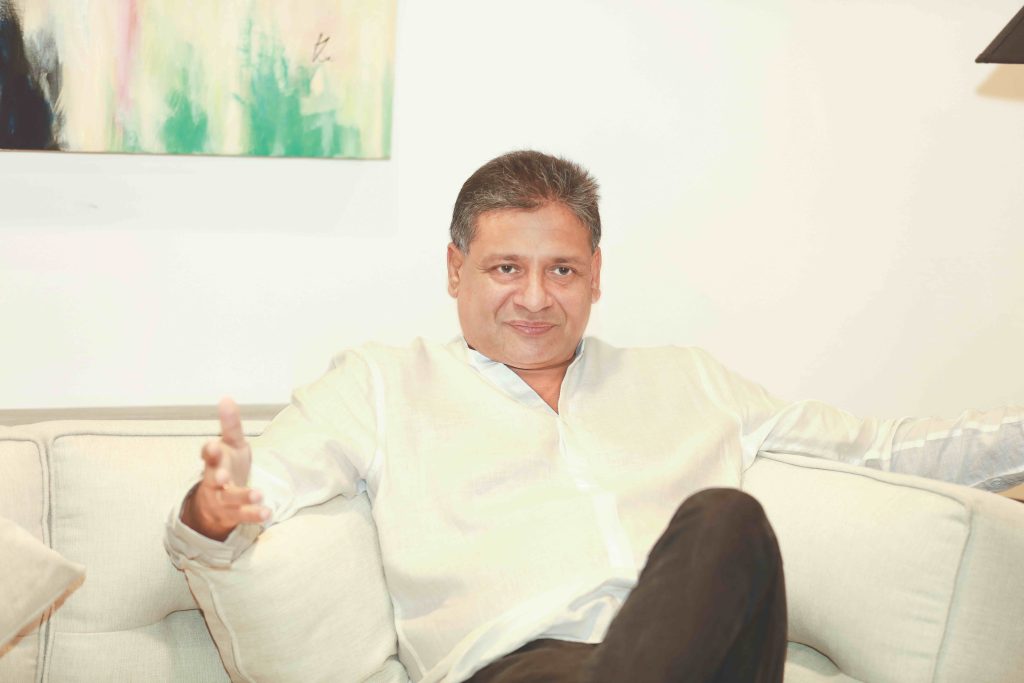Dilith Jayaweera, leader of the Mawbima Janatha Pakshaya, is best known for propelling Gotabaya Rajapaksa to prominence and then to power. He is no stranger to controversy and no stranger to spreading sensational stories; Dilith knows that many people love to hate him. They even blame him for being one of those responsible for promoting an inept leadership that led this country to its worst economic crisis. Speaking to Business Today, Dilith admits his mistake but says he did it in good faith. Deeply regretful of his role in the 2019 presidential election, he offers himself as the alternative savior, promising to right the wrong. He sees little promise in the current leadership or those waiting in the wings. He promises to be the different leader that the country seeks, who will drive for a paradigm shift. To create an entrepreneurial state based on a strategic plan. He has a vision for Sri Lanka and wants the people to be partakers of his dream for the country. His ultimate dream is to create motivated people and a happy nation.
Words Jennifer Paldano Goonewardane.
Photography Sujith Heenatigala and Dinesh Fernando.
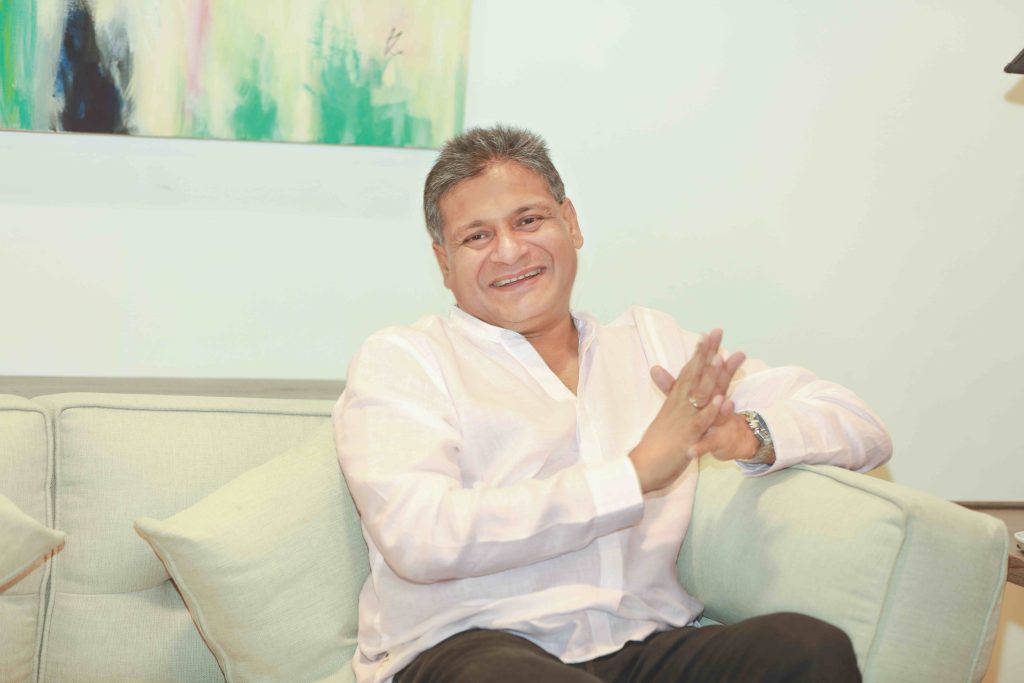
Dilith Jayaweera, leader of Mawbima Janatha Pakshaya.
Why does Sri Lanka need Dilith Jayaweera now?
My entry into politics differs significantly from everyone else in Sri Lankan politics. Of course, I have been in politics, indirectly, for more than thirty years. I’ve been supporting individuals and parties, assisting with campaigns, researching and analyzing data, and working with people on the ground. However, I had not thought of getting into politics. I formed my political party, the Mawbima Janatha Pakshaya, when I realized that Gotabaya Rajapaksa couldn’t deliver what we expected. Our expectations of Gotabaya Rajapaksa were very high. We didn’t create those expectations. Those were the people’s expectations.
But we realized early on that he would not and could not deliver. He may have intended to deliver, and I believe he did. However, he needed the infrastructure, but his family never allowed him to deliver on his promises.
Secondly, I observed that he was weak in management and lacked the personality for the office he was serving. One cannot keep blaming others for what he did or did not do. For instance, the appointment of P. B. Jayasundara as the Secretary to the President within a week of his victory was the most significant drawback, signaling the beginning of a disaster. His family’s entry followed that, that is, the entry of Basil Rajapaksa to parliament following the twentieth amendment to the constitution and taking over the affairs of governance and finance. Then, we witnessed Namal Rajapaksa and Basil Rajapaksa run the show from behind the scenes. I am convinced that Basil Rajapaksa had a dream of becoming the president. Therefore, he wanted to find the shortest and closest path to the presidency, and he expected Gotabaya Rajapaksa to resign, making way for him to become the president, the way Ranil Wickremesinghe was appointed. So, he did many things purposely to tire and frustrate GR.
Today, I am among the most disappointed of the 6.9 million voters because I supported GR with a big dream, just like the youth who painted walls following his overwhelming victory. What do I do now? I can confess to the people that I made a mistake, but a confession alone would not help if we want change.
If you look at the available options with the political parties, their ideologies, and the leaders, do you believe they can take the country forward? Well, I am not convinced that they can. All this while, we have depended on an individual to deliver our dream, and if not delivered by one individual, we choose another. And the rest of us don’t want to get into politics because politics is deemed ugly, corrupt, and not the sort of terrain anyone sane would like to enter. And then, at some point, I realized that those in politics muck the terrain on purpose so that a genuine individual cannot join it and serve honestly. Today, the popular sentiment is that an honest individual cannot operate in the dirty world of Sri Lankan politics. Our politicians purposely sully the terrain. Much like a person who uses the toilet in a way that the next person can’t use it. We should not allow that to happen.
The problem with leaders and aspiring leaders in Sri Lanka is that they need a vision for the nation; they’ve never had a proactive strategy, drive, or the required depth of knowledge.
We must work with a different team to realize the larger vision of building a happy nation, for which we should transform Sri Lanka into an entrepreneurial state driven by the concept of nationalism. We are looking to drive the envisaged change through a strategic plan.
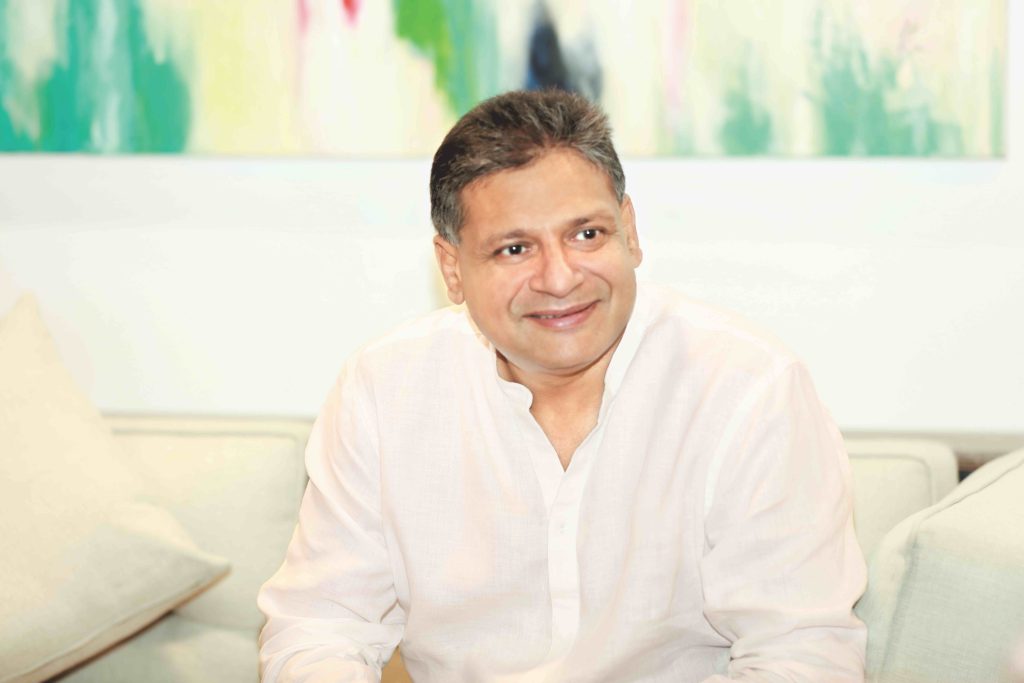
Our leaders have never sold a vision to the people to get them involved in achieving a dream. All they’ve been doing is asking for power to do this or do that but there needs to be a vision for a country. The JVP wants power to punish the political thieves. Ending corruption and punishing political crooks could be a mission to achieve a more significant dream. The SJB has not offered an option by way of a position. They fiddle as a party. The President is still determining what he wants to do. In this complex setup and from the people’s perspective, it’s apparent that we need to do something to change the country’s course.
You said you want to get into this muddy, political playground. But it’s not a lone journey. The intricacies are such that brokering deals and buying over numbers and the support is the name of the game. How do you plan to navigate that game?
I am willing to get into the game with good intentions. I will get into this pothole and work with anyone shoulder to shoulder for the sake of my country. I may have to resort to certain moves because one can’t change things overnight. I am willing to compromise and sacrifice to achieve my dream. I am immersed in my journey to achieve my dream for Sri Lanka; I have given up positions in the commercial world and don’t intend to return to it. I know that this is not a short-term journey.
What sort of a team are you looking to work with?
It must fundamentally be a set of people that support my vision and values. In politics, you need two types of teams. One is a team of popular people who can go to the people to get you the votes. You have to have a hybrid of people who can garner ground support, the so-called popular people in the community or village, those who are regulars at an almsgiving, wedding, or funeral, people we need to win the votes to win the election. So, ground support is vital to win the battle for votes.
However, we must work with a different team to realize the larger vision of building a happy nation, for which we should transform Sri Lanka into an entrepreneurial state driven by the concept of nationalism. We are looking to drive the envisaged change through a strategic plan. I emphasize a strategic plan rather than a manifesto because manifestos are yet to deliver what people have expected of them. Manifestos have turned out to be mere books. However, a strategic plan will map out the vision for Sri Lanka. A time-bound strategic plan will define our objectives, how we hope to achieve them, with corresponding numbers and specific timelines and the strategies we hope to adopt. Hence, we have to work with a combination of these two teams.
The bureaucracy is a strong group, and when you have a strategic plan for the country, you must ensure they are on board. How do you plan to do that?
As much as part of the bureaucracy is corrupt, it doesn’t mean the bureaucracy in its entirety is corrupt. But in a changing environment, in a motivated nation, where the bureaucrats have bigger dreams than just soliciting bribes, a dream for their families and their country, I believe they will not get into such petty acts.
The private sector is also corrupt. I always say that the private sector is more internally corrupt than the government. I know people who take commissions in private organizations, sometimes more than government corporations. However, most private sector companies come out of it by creating a different organizational culture that motivates them, thereby negating the reasons for corruption. Hence, if we drive this change with the people, onboarding the bureaucracy on this journey, there will be no reason for them to be corrupt or inefficient. They are all part of society.
Today, people have come to accept bureaucratic corruption as the norm. People are no longer worried about flaunting their ill-gotten wealth in the houses they build, the vehicles they drive, or by sending their children abroad for education. They are no longer apprehensive of society’s view of them as dishonest and corrupt. Politicians, bureaucrats, and businesspeople are part of this vicious cycle. But imagine if they all decided to eventually give up on their corrupt practices and serve honestly in their roles. The Global North is what it is today because it established the necessary systems to block corruption in those societies. However, a paradigm shift in people’s thinking is required to stop bureaucratic inefficiency, apathy, and corruption.
So, can all this stop the politicization of the public sector?
If that is the central narrative, then we must change it. Otherwise, people will have no choice but to work on that narrative. It comes from and within society. For example, during the war, the popular narrative was that we could not win the war. As the owner of a media organization, I was broadcasting positive messages while meeting people, the clergy, and visiting camps to change people’s mindsets. Then, Sri Lankans began believing that we could win the war. Likewise, stopping the politicization of the public sector is a massive but doable task; we have to try. It is a daunting task achievable in our lifetime if we do it with commitment. But it all boils down to individual agendas. Saying one thing and doing another will not achieve the goal.
The ethnic question has been a simmering issue in the country’s history. To create a united nation, you must ensure everyone endorses your vision for the country. How do you hope to bring all the dissenting groups under your agenda?
The Mawbima Janatha Pakshaya’s political approach has two points. One is the ideology of the entrepreneurial state. Being an entrepreneurial state does not mean we promote private entrepreneurship in Sri Lanka. An entrepreneurial state thinks like an entrepreneur, where decisions are creative, and everyone is proactive and risk-taking like entrepreneurs. We can witness this with India today.
Secondly, all these successful countries across the world believe in nationalism. They bring people together under the concept of nationalism. In Sri Lanka, nationalism is a term that is heavily misunderstood and misused. Most of the ethnic groups, including Sinhala Buddhists, are politically misused. As a result, people in this country have no idea what genuine nationalism is. Today, when someone identifies themselves as a nationalist, many assume that such an individual is a Buddhist extremist. The concept of nationalism is a territorially controlled environment described as a nation with a predominant civilization and system of values. It always has something to do with race and religion. It’s common everywhere. For instance, the US has white Christians and Christianity. So, white-Christians through their predominance have formed their culture, which still endures. It doesn’t necessarily mean that you have to be a white Christian to be an American. Anyone can be an American. But one is bound by, directly and indirectly, to those civilizational values. It’s the same with Arab Islamic countries. Similarly, India is predominantly Hindu, and hence, so are their civilizational values.
In such contexts, the predominant civilization impacts every other religious or ethnic group of that country. In Sri Lanka, one doesn’t have to be a Sinhala Buddhist to be a Sri Lankan. Sinhala-Buddhist is a civilization like the Mohenjo-Daro civilization. A civilization is a set of values. Anyone who gains US citizenship must take their oath upon the Bible, regardless of religion. It would be the same in an Arab country. The beauty of Sri Lanka is that its predominant culture does not have a god. As a result, we are the most liberal civilization on earth. Because, as a Buddhist, I can marry anyone. I can go to any Christian church. I can go to even a mosque because the Sinhala Buddhist civilization does not have a god. Across the world, everyone is fighting for their god and messenger and their religious books. That doesn’t apply to us; we are a liberal nation. As a result, our nationalism does not create differences between the majority and the minorities.
Then how are we divided? All Christians in Sri Lanka were Sinhala Buddhists a few generations ago. Today, they are Sinhala Christians. Every Muslim in Sri Lanka has got fifty percent of their genes from the Sinhala race. The majority of the people in Sri Lanka are Sinhala Buddhist by birth. My point in detailing the histories is to point out the opportunity for us to unite. Politicians created the majority-minority narrative, and that has been so everywhere in the world. And geopolitics would encourage differences in Sri Lanka. They talk about secularism but desire conflicts between majority and minority groups to intensify because it is to their advantage that the people in the country stay divided.
The British used the same tactics of dividing us by religion, ethnicity, and caste. Today, some countries like to see us divided and deeply buried in majority-minority politics. It is promoted and cultivated by multiple forces within and outside the country. We should not fall victim to that trap.
Our party has given an unambiguous definition. Sri Lanka is Sinhala-Buddhist, but that does not mean you must be a Sinhala or a Buddhist to be a Sri Lankan. It is a term used to refer to Sri Lanka based on its civilizational values and does not conflict with any other religion. And it is on this basis that we want to unite every group in Sri Lanka. The differences should not impinge on the collective effort of Sri Lankans. And this is precisely what the rest of the world practices. The US may want to tutor us on this, but they are very nationalistic to the extent of becoming more and more racist, pushing for the white-American dream.
The Latin word Mens Rea, a legal term, refers to intent or state of mind. If those who identify themselves as minority feel that they are so, then it has been created by the politicians and not the people. I consider everyone as a majority. No one feels marginalized in one-to-one associations as Sri Lankans in Sri Lanka, but if you lived in a country like the US, you would feel it in everyday associations. Politicians promote a feeling of them versus us by constantly speaking about it, thereby driving a wedge between groups and creating separate identities rather than a single identity of a Sri Lankan. Politicians create situations. They create radical monks and clergymen. Such individuals don’t represent or reflect the views of the majority of the Buddhist clergy.
I am not in a power game and don’t intend to use my office to prosper materially. I believe in something better for the country and will try to deliver it, which is my promise to everyone in Sri Lanka.
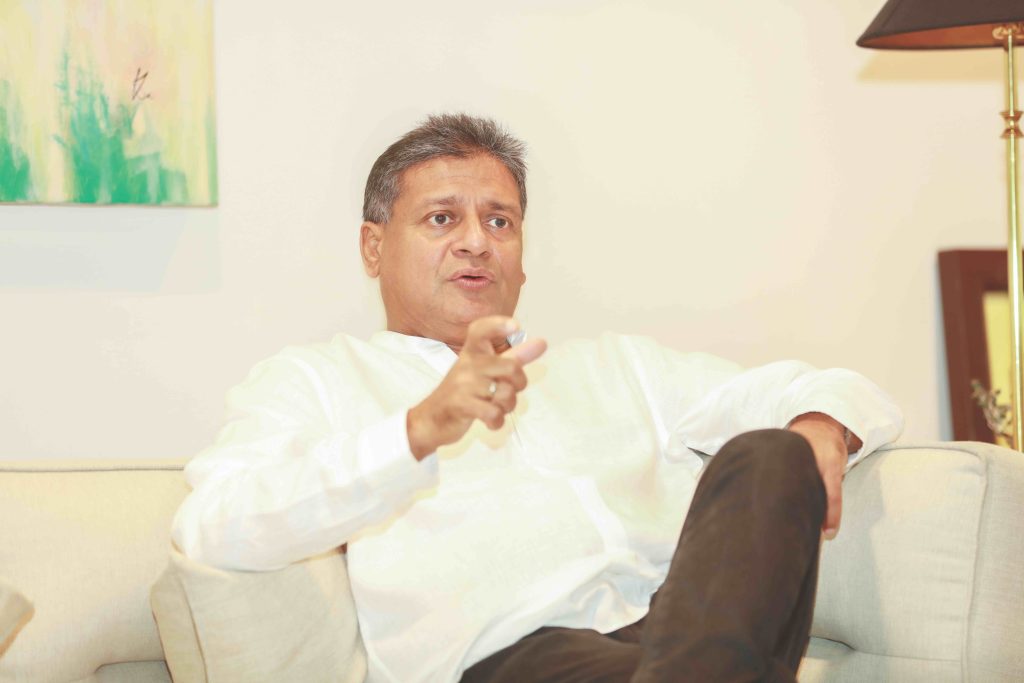
Has the proportional representation system produced intense competition for votes, and hence, politicians are staying in the game by buttressing their constituents and supporters by giving them various favors, such as employment? Should that be changed?
England does not have a written constitution; their system of government runs on traditions. We have the best constitution, but politicians will always find a way to circumvent its provisions. But we have a plan for that under our strategic plan. We are fine-tuning it, and we will reveal it in due course. We will offer a scientific and quantifiable proposition. It will be an irresistible offer to Sri Lankans, which they will find difficult to reject.
I believe in a paradigm shift if we wish to steer the country in a new direction because we have tried every other option and failed.
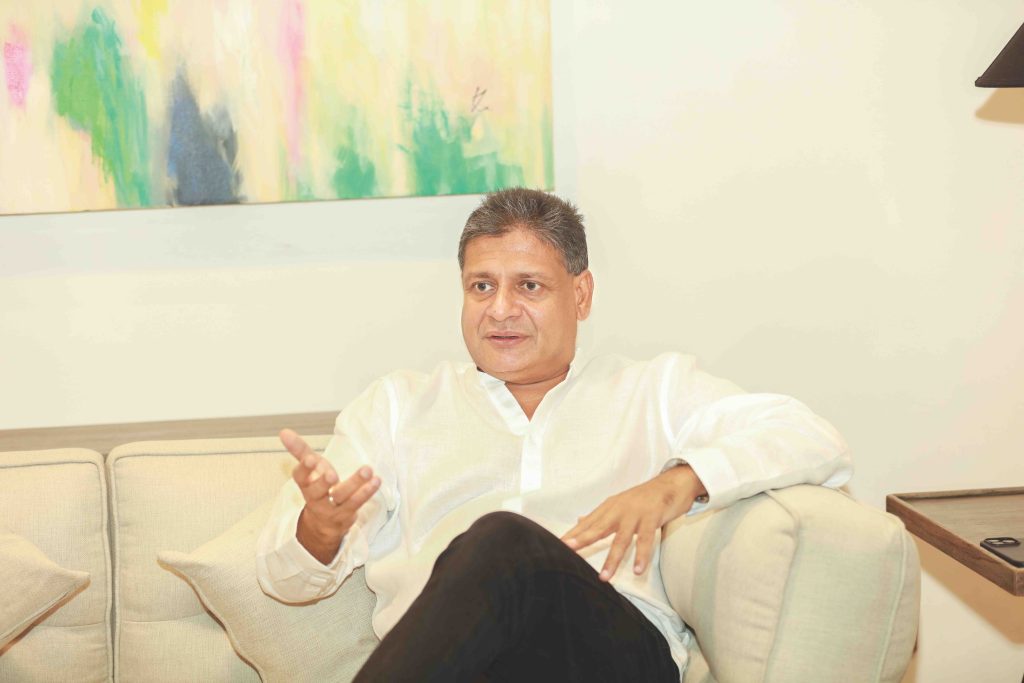
How do you plan to steer the murky waters of geopolitics, in which Sri Lanka has often been caught in the middle and a victim of its maneuverings?
Weak territories are the victims of geopolitics. They take over after weakening you. How do you become weak? When you are internally fighting. It’s just like when a husband and a wife are fighting. The man next door is constantly eyeing the neighbor’s wife, hoping for an opportunity to reach out to her.
The geopolitical interventions would diminish if we unite to implement the changes our country needs. But today, the geopolitical games played around Sri Lanka are because they consider us a weak nation. Naturally, they would make us weaker for their strategic benefit, and they’d love a nation fighting about everything under the sun, from politics to nationality, ethnicity, race, and caste. We can’t blame them. It’s a strategy for them. But we should be sharp enough to avoid getting trapped by their maneuverings.
What would be your foreign policy?
Our foreign policy is multi-aligned and strategically driven. We don’t believe in non-alignment or alignment. It should go hand in hand with the country’s economic strategy. We must sort out our economic and defense strategies. We can’t expose this little island to any external powers and become vulnerable, so we will have a strategically multi-aligned foreign policy that puts Sri Lanka first.
Why have successive governments that have spoken extensively on driving investment in the island failed to deliver?
Because none of the governments or their representatives have been honest. One must negotiate from a country’s perspective, not for personal benefits or on behalf of your cronies and friends. Negotiating for the country’s sake was never the case with Sri Lanka. I can sum it up succinctly. The finance minister of India would speak on behalf of her country. However, the finance minister of Sri Lanka would be representing his friends. Our representatives would willingly change the terms of agreements if it serves their interests rather than the country’s. We need nationalistic leaders. And that’s the change I wish to bring.
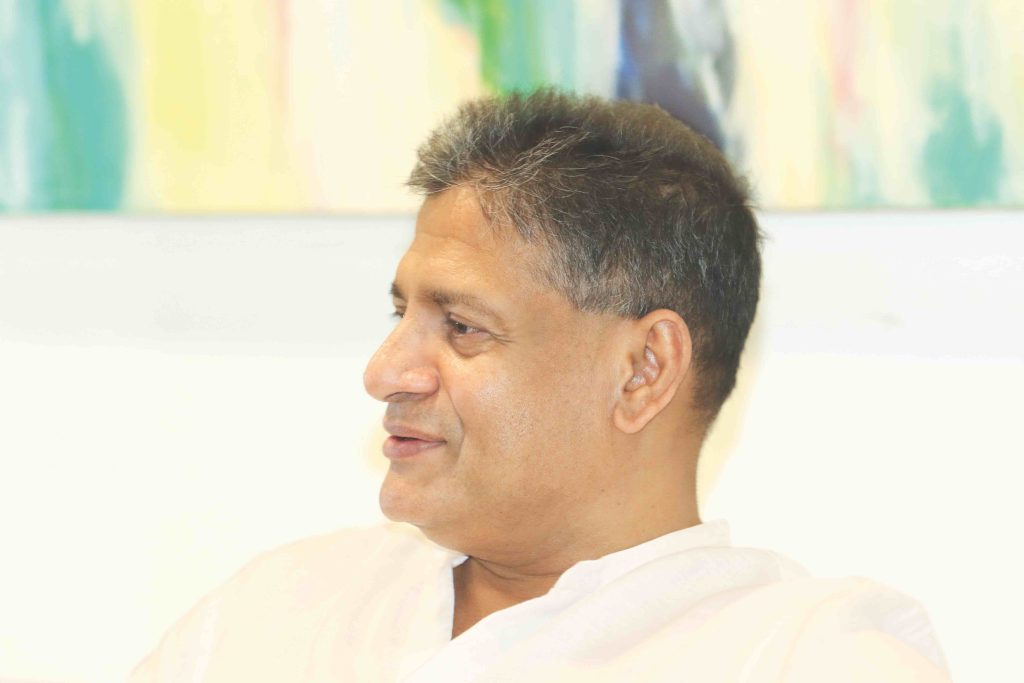
Many young people joined the campaign for Gotabaya Rajapaksa, but today, the same people who had so many expectations and hopes and voted for him can’t wait to leave the country. What will you do to make it a better country for them?
The youth have lost hope; now it’s time to build hope and opportunities for them to return and stay in Sri Lanka. It has to be a credible hope that they can experience. Some are escaping due to the loss of hope. Some are angry. They want to punish themselves and everyone else. They are the ones who rally around Anura Kumara Dissanayake. Others are leaving the country or trying to leave the country. They don’t want to be a part of any of this. Some others want to get a more harmful leader in power and ruin the country further. Hence, we want to convince these people that none of those they resort to are solutions. It’s more like self-inflicted pain.
People still remember how much you campaigned for Gotabaya Rajapaksa. So why should people believe you now?
Convincing people of my intentions would be another task. I must convince the people that my intention to support GR was good. I knew Gotabaya Rajapaksa as a disciplined man who ran the war and was committed to the beautification of Colombo, and that was my experience and conviction. But most importantly, today, I realize I made a mistake and acknowledge that blunder. None of the individuals leading other parties who hope to run for the presidency will be able to speak the way I do.
Many young people have taken Anura Kumara Dissanayake as the option, but how can he be a credible option when he has been in parliament for more than twenty years and has served in three governments? What has he done? I made a mistake once, and I can still be proud that atleast GR didn’t kill a single person to hold on to power; he left when the people said that they didn’t want him and gave it to the person the people thought was the best. He didn’t go against the will of the people. If I have contributed to the damage, it is insignificant compared to the individuals now demanding for power. I have not been in the political system. I only did a campaign to bring to power a person I thought was good. If I hadn’t supported him, who would you have gotten as the president? I supported the best out of the three. If Anura Kumara Dissanayake’s wish was to defeat Gotabaya, he shouldn’t have contested because by contesting, he took four hundred thousand votes that would have been Sajith Premadasa’s.
No one claims today that Gotabaya Rajapaksa was a crook. Corruption was rife then, but he avoided that label and changed the political culture by doing away with large hoardings and entourages. It was his extended family that had him removed for not complying with their wishes. I can name the businesspeople who funded the Aragalaya, their corrupt business practices, and how they impact the country’s growth. They didn’t want to get rid of Gotabaya Rajapaksa because he was terrible, but because they couldn’t cut deals. Today, the country is paying a high premium for oil, including coal and gas, and if you check the people behind it, you will find the same old clan. They are robbing more out of power, than when they were in power and it is those corrupt business deal-makers who are behind them. And it is these businesspeople who are taking crowds’ to Anura Kumara’s rallies. I am against all this and committed to changing this political culture.
You were someone who helped people launch their political careers and campaigns, propelled many into the mainstream, and helped them come to power. But today, you have changed your chorus and are taking a different path rather than aligning with a political party. Why have you taken this new path?
There’s nothing called impossible. Our experience with the country defines how we think. Our experience has ingrained the belief that things are impossible. But our past doesn’t always have to be the truth, nor does it have to define us. I’ve seen the world and witnessed paradigm shifts. Some of us have done the impossible. One such thing was bringing Gotabaya Rajapaksa to power when his whole family was against it. The outcome was disastrous, but I achieved the impossible.
I have invited one hundred and ninety-three members of parliament, out of whom I have identified fifty-three as non-corrupt. The fifty-three I have identified may have received certain favors and benefits, but by and large, they are genuine. Right now, I am in conversation with these fifty-three members of parliament. I intend to expand my party or opt for a coalition. However, I can work with anyone, even the biggest crook. As an employer, I have hired a range of different individuals, and I’ve got many phone calls discouraging me from recruiting specific individuals over their poor credentials. However, I tell them they will not be so in our organization, and ninety-nine percent of the time, I have been proven right. Therefore, I am ready to work with anyone, but I will first make my journey known to them. I will establish the systems to control corruption. And I will most importantly ensure they align with our ideology and strategic plan.
